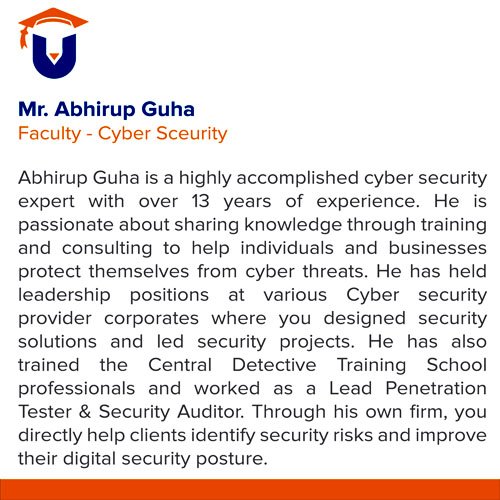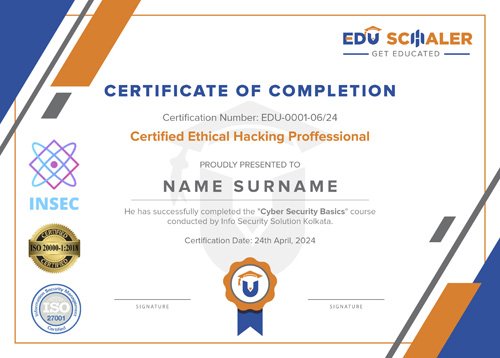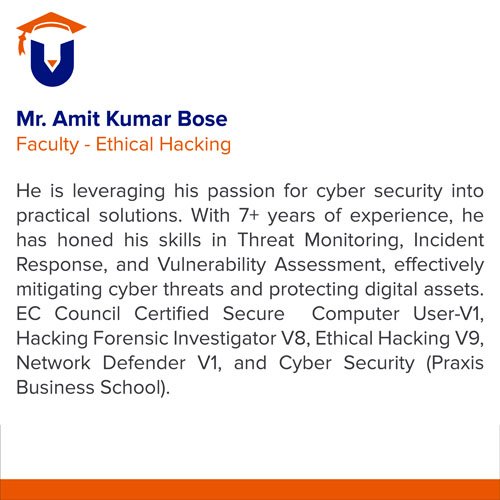


Basic (10 classes): 20 Hours - 10 Days Course
- Target Audience: Individuals with no prior cybersecurity knowledge.
- Course Goal: Establish a strong foundational understanding of cybersecurity concepts and best practices.
Module Breakdown:
- Module 1 (2 classes): Introduction to Cybersecurity:
- What is cybersecurity?
- Types of cyber threats and attacks
- Importance of cybersecurity in today’s world
- Module 2 (2 classes): Secure Online Habits:
- Password hygiene and management
- Social engineering awareness and prevention
- Safe browsing practices
- Identifying phishing scams
- Module 3 (2 classes): Network Security Fundamentals:
- Understanding basic network concepts (firewalls, routers)
- Introduction to secure network configurations
- Securing your Wi-Fi network
- Module 4 (2 classes): Data Security Basics:
- Data classification (sensitive vs. non-sensitive)
- Data encryption and decryption methods
- Secure data storage practices
- Data backup and recovery strategies
- Module 5 (2 classes): Introduction to Security Tools:
- Overview of common security software (antivirus, anti-malware)
- Learning basic functionalities of security tools
Intermediate (15 classes): 28 Hours - 15 Days Course
- Target Audience: Individuals with basic cybersecurity knowledge, looking to deepen their understanding.
- Course Goal: Expand upon foundational concepts with practical applications and introduce intermediate security topics.
Module Breakdown (Building upon Basic modules):
- Module 1 (2 classes): Operating System Security:
- Hardening operating system configurations (Windows, macOS)
- User account management and access control
- Software updates and patch management
- Module 2 (2 classes): Introduction to Cryptography:
- Encryption and decryption algorithms
- Public key infrastructure (PKI) and digital certificates
- Understanding secure communication protocols (HTTPS)
- Module 3 (2 classes): Web Application Security:
- Common web application vulnerabilities (SQL injection, XSS)
- Secure coding practices
- Web application security testing basics
- Module 4 (2 classes): Introduction to Network Security Controls:
- Firewalls (types, functionalities)
- Intrusion Detection and Prevention Systems (IDS/IPS)
- Access Control Lists (ACLs)
- Module 5 (2 classes): Secure System Administration:
- User privilege management
- System logging and monitoring
- Vulnerability scanning and patching
- Module 6 (2 classes): Introduction to Incident Response:
- Recognizing security incidents
- Incident response procedures
- Data breach recovery
- Module 7 (2 classes): Introduction to Risk Management:
- Identifying cybersecurity risks
- Vulnerability assessments and risk mitigation
- Business continuity and disaster recovery planning
Advanced (25 classes): 48 Hours - 25 Days Course
- Target Audience: Experienced cybersecurity professionals seeking to enhance their skillset.
- Course Goal: Deep dive into advanced topics, introduce penetration testing methodologies, and explore security frameworks.
Module Breakdown (Building upon Intermediate modules):
- Module 1 (2 classes): Introduction to Penetration Testing:
- Penetration testing methodologies
- Tools and techniques used by ethical hackers
- Vulnerability exploitation and post-exploitation activities
- Module 2 (3 classes): Linux Security Administration:
- Advanced Linux system administration for security
- Security tools and utilities on Linux (e.g., iptables, SELinux)
- Scripting for automation in security tasks
- Module 3 (2 classes): Introduction to Cloud Security:
- Security considerations for cloud platforms (AWS, Azure)
- Identity and Access Management (IAM) in the cloud
- Cloud security best practices
- Module 4 (2 classes): Secure Software Development (SSD):
- Secure coding principles and practices
- Application security testing methodologies (SAST, DAST)
- Integrating security into the software development lifecycle (SDLC)
- Module 5 (2 classes): Digital Forensics and Incident Response (DFIR):
- Digital evidence collection and analysis techniques
- Incident response forensics
- Forensic tools and software
- Module 6 (2 classes): Introduction to Security Operations Centers (SOC):
- SOC functions and responsibilities
- Security monitoring and threat detection
- Security information and event management (SIEM)
- Module 7 (3 classes): Ethical Hacking Techniques:
- Advanced exploitation techniques (buffer overflows, privilege escalation)
- Web application penetration testing methodologies (OWASP Top 10)
- Wireless network security assessments
- Module 8 (2 classes): Cryptography for Security Professionals:
- Advanced cryptographic algorithms (AES, RSA)
- Hashing functions and secure password storage
- Secure communication protocols (VPN, SSH)
- Module 9 (2 classes): Security Frameworks and Compliance:
- Introduction to popular security frameworks (NIST CSF, ISO 27001)
- Implementing security controls based on frameworks
- Compliance requirements for different industries
- Module 10 (2 classes): Introduction to Social Engineering:
- Social engineering techniques used by attackers
- Human behaviour and susceptibility to social engineering
- Countermeasures against social engineering attacks
- Module 11 (2 classes): Cybersecurity Career Paths and Resources:
- Exploring different career opportunities in cybersecurity
- Preparing for industry certifications (e.g., Security+, CISSP)
- Staying up-to-date with the latest cybersecurity trends
